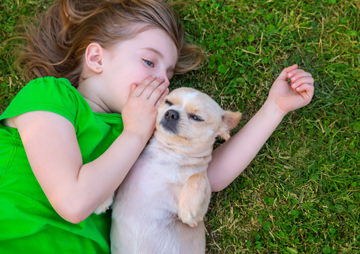Do We Love Our Pets Like We Love Our Kids? Scientists Weigh In
Scientists have decided to weigh in on a question many canine lovers may have asked themselves before: Is the love we feel for our dogs akin to that we experience for our offspring? Not only is the answer to this question yes, but apparently, it’s been happening for centuries on end. Salon: “Alloparenting,” or adopting […] Secret's out: Mommy loves both of you the same. Shutterstock
Secret's out: Mommy loves both of you the same. Shutterstock
Scientists have decided to weigh in on a question many canine lovers may have asked themselves before: Is the love we feel for our dogs akin to that we experience for our offspring? Not only is the answer to this question yes, but apparently, it’s been happening for centuries on end.
Salon:
“Alloparenting,” or adopting and caring for different species– has occurred for tens of thousands of years (the first domesticated dog dates back to 32,000 years ago). Around two-thirds of American households have pets and spend over $50 billion every year on their well-being.
In [a recent PLOS ONE] study, researchers from Massachusetts General Hospital sought to directly compare the “functional neuroanatomy of the human-pet bond with that of the maternal-child bond.” To do so, they had women look at photos of their babies and their dogs, as well as babies and dogs that they didn’t know.
“There was a common network of brain regions involved in emotion, reward, affiliation, visual processing and social cognition when mothers viewed images of both their child and dog,” reads the study. The unfamiliar photos didn’t provoke the same reaction.
—Posted by Natasha Hakimi Zapata
Your support matters…Independent journalism is under threat and overshadowed by heavily funded mainstream media.
You can help level the playing field. Become a member.
Your tax-deductible contribution keeps us digging beneath the headlines to give you thought-provoking, investigative reporting and analysis that unearths what's really happening- without compromise.
Give today to support our courageous, independent journalists.






You need to be a supporter to comment.
There are currently no responses to this article.
Be the first to respond.